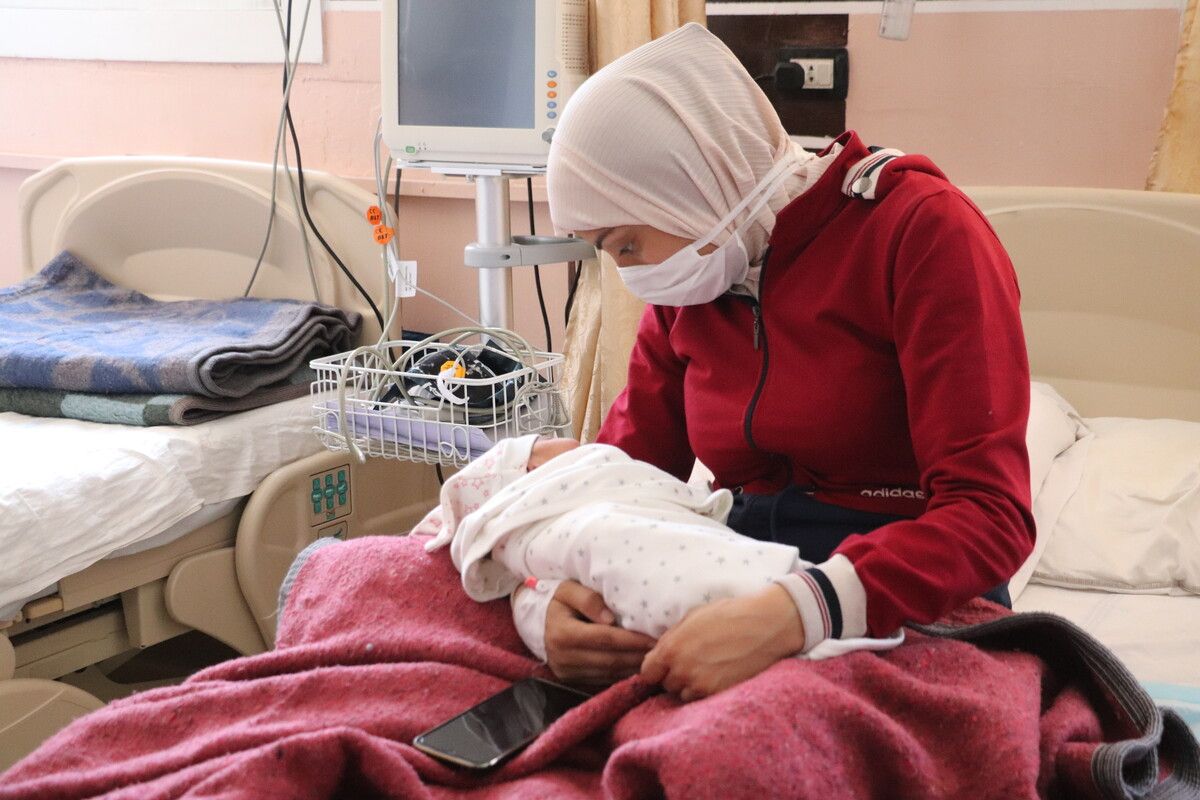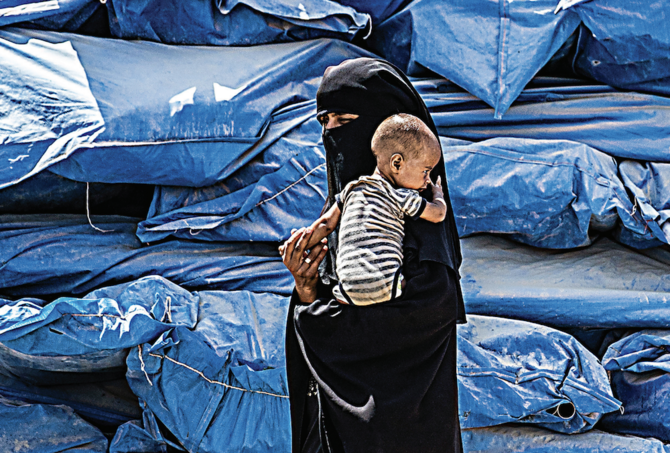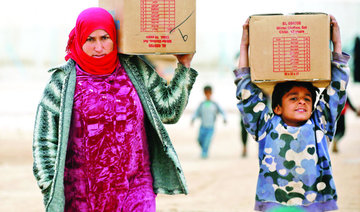LONDON: Pregnancy and childbirth can be dangerous for expectant mothers under normal circumstances. But in Syria’s war-torn, earthquake-stricken northwest, bringing new life into the world has become a harrowing ordeal.
Early marriage, a common occurrence in a region where households face financial hardship and girls are vulnerable to gender-based violence, often means young mothers are not sufficiently developed to cope with the physical demands of childbirth.
Combined with the absence of specialized health facilities, a shortage of medical professionals, and the impact of malnutrition caused by the ongoing conflict and barriers to foreign aid deliveries, maternal mortality in northwest Syria is high.
A recent report by UNICEF (the UN Children’s Fund) revealed a decline in the nutritional status of children below the age of five and among pregnant and breastfeeding women in the region’s displacement camps and war-scarred communities.
Diana Al-Ali, founder of the local nongovernmental organization Suriana, told Arab News: “Many postpartum mothers in displacement camps suffer from severe anemia and vitamin deficiencies.
“There has been a shortage of medication and nutritious food. We managed to supply baby formula, but the food allocated for lactating mothers fell short. We tried our best to provide them with bread and clean drinking water.”
At least 2.3 million women and girls in northwest Syria cannot access adequate sexual and reproductive health services, according to Physicians for Human Rights. Even prior to the Feb. 6 earthquakes, health infrastructure had already been devastated in the fighting.

New mum, Abeer, gave birth after falling while pregnant during the Syrian earthquake. (Sonya Al-Ali Maara/ActionAid)
In the country’s northwest, the earthquakes damaged 55 health facilities, suspending services in 15 of them, according to a Medecins Sans Frontieres report published in March.
Al-Ali said: “After the quake struck, there were pregnant women who went into labor under rubble or after surviving the tremor. However, no organization aided these women immediately after the disaster.
“Armanaz in northwestern Idlib, where Suriana operates, lacks a maternity hospital and clinics specialized in women’s reproductive health. Even the local hospital lacks gynecologists and only a midwife is available.”
Violet, a Syrian organization that runs two hospitals in Ein and in Azaz, has identified significant shortages in medications, equipment, and services, particularly those related to women’s reproductive health.
In part, these shortages were caused by the failure to renew a UN Security Council agreement that allowed for aid to enter northwest Syria directly via the Bab Al-Hawa border crossing from Turkiye.
The enclave, largely populated by families displaced by fighting elsewhere in Syria, is one of the last holdouts of the country’s armed opposition that rose up against Syrian President Bashar Assad’s regime following its crackdown on anti-government protests in 2011.
Years of regime shelling and air attacks have devastated the northwest region’s health infrastructure. According to Physicians for Human Rights, many among the traumatized population are too afraid to spend long in hospitals for fear they will be bombarded.
Russia, the Syrian government’s main international backer since 2015, vetoed the long-established Bab Al-Hawa agreement in July, requiring all humanitarian deliveries to pass through Damascus instead before their onward distribution to opposition-held areas.

Early marriage, malnutrition and shattered health facilities have all contributed to rising maternal mortality. (AFP)
Mohamad Isso, Violet’s health projects manager, told Arab News: “With the non-renewal of the cross-border resolution, we are highly concerned about the continuity of the essential health service that is completely dependent on the cross-border humanitarian operations.”
Thankfully, for the 4.6 million people in northwest Syria who depend on this vital aid corridor, a deal was reached with Damascus on Aug. 9 to reopen the crossing to humanitarian assistance for the next six months — when it will again be subject to renewal.
In the face of these interruptions to the flow of aid, Violet’s hospitals managed to provide medical consultations to at least 3,967 women and infants in June alone.
Of these, 428 were childbirths, both natural and cesarean section, 1,183 were consultations in the outpatient clinics, 262 were infant inpatients, and 2,094 were infant consultations.
Isso said: “While health centers do exist, they do not fully address women’s needs for reproductive health services.
“Despite the continuing collaborative efforts of various local and international organizations, including but not limited to the UN, significant gaps persist. These gaps include a shortage of medications, with patients often required to acquire medicines on their own for use during hospitalization.”
Isso also highlighted a shortage of services in essential facilities, such as laboratories and advanced imaging, which are particularly important for the early detection of growths, including breast and cervical cancer.
FASTFACTS
* Of the 4.6m people in northwest Syria, 63% are IDPs, of whom almost 80% are women and children.
* 2.3m women and girls do not have easy access to medical care, including sexual and reproductive health.
* Although 40% of the population live in camps, only 18% of all health facilities are in camp settings.
(Source: Physicians for Human Rights)
“In addition, there is a scarcity of human talent and expertise due to the severe brain drain, as medical cadres have been migrating to Europe and other parts of the world,” Isso added.
There is also the question of access, with many women and girls struggling to reach centers that offer reproductive health services.
“Access difficulties are the result of several factors, including geographical distance, insufficient financial means, or limited transportation options. This situation is particularly relevant for girls of childbearing age and newly married women.
“Women’s ability to access healthcare centers depends on having a companion such as a spouse or a guardian present for support or protection. This requirement further complicates women’s ability to schedule their visits to doctors,” Isso said.
Those health facilities that do exist are often located in overcrowded urban areas, stretching staff and services to their limit. Meanwhile, rural areas are badly underserved.
“The presence of a healthcare center depends on the location. In the city of Idlib, for instance, there are health centers and hospitals that provide integrated reproductive health services, but they are always crowded due to the population density,” Isso added.
In the displacement camps where Violet operates, Isso noted that “the health facilities are either a mobile clinic or a primary healthcare center.” These clinics “are equipped with basic materials for examinations, and often suffer a shortage of medicines” and “the sole medical professional available is a midwife.”
Other camps are not so well equipped.

A pregnant Syrian woman walks at a refugee camp in the city of Tyre, in southern Lebanon. (Reuters/File Photo)
Al-Ali said: “There is no mobile clinic (where Suriana operates) to service women and provide them with medicines, necessary vitamin supplements, or sanitary products.
“For a long time after the quake, there were no nearby washrooms for displaced women. Postpartum mothers had to walk long distances just to use the bathroom (until charitable organizations built new restrooms for them).”
The lack of adequate services is especially dangerous for minors, many of whom were forced into early marriage as their parents could no longer afford to keep them, such is the financial desperation of displaced households.
Complications in childbirth are more common among these young mothers.
Hamzah Barhameyeh, advocacy and communication manager at the child-focused charity World Vision, told Arab News that conflict and economic collapse were the primary drivers behind the rise in the number of child marriages.
He said: “People in northwest Syria are struggling to make ends meet. A (seemingly) reasonable way out is to marry off their daughters at a young age to relieve themselves of some of the economic burdens they are facing.
“With the recent earthquake, we are expecting a dramatic rise in child marriage.”
Barhameyeh pointed out that World Vision’s support “takes a holistic approach,” aiding children, families, and their communities through projects aimed at tackling malnutrition, which includes direct food support to pregnant and lactating mothers.
Another focus was the provision of mental health support to mothers and their children as a preventive measure, he added.
Suriana, meanwhile, was now preparing training courses tailored specifically for new mothers to help them look after themselves and their infants.
“But our efforts need support from other bodies, which can provide mobile infirmaries to help mothers care for their health and their newborns,” Al-Ali added.






























